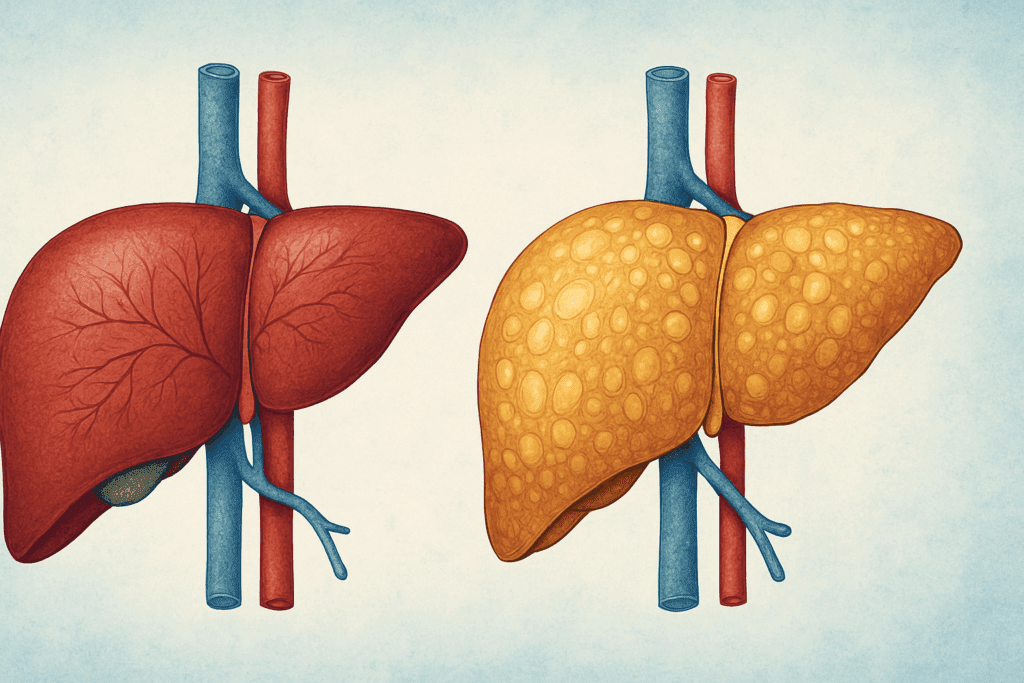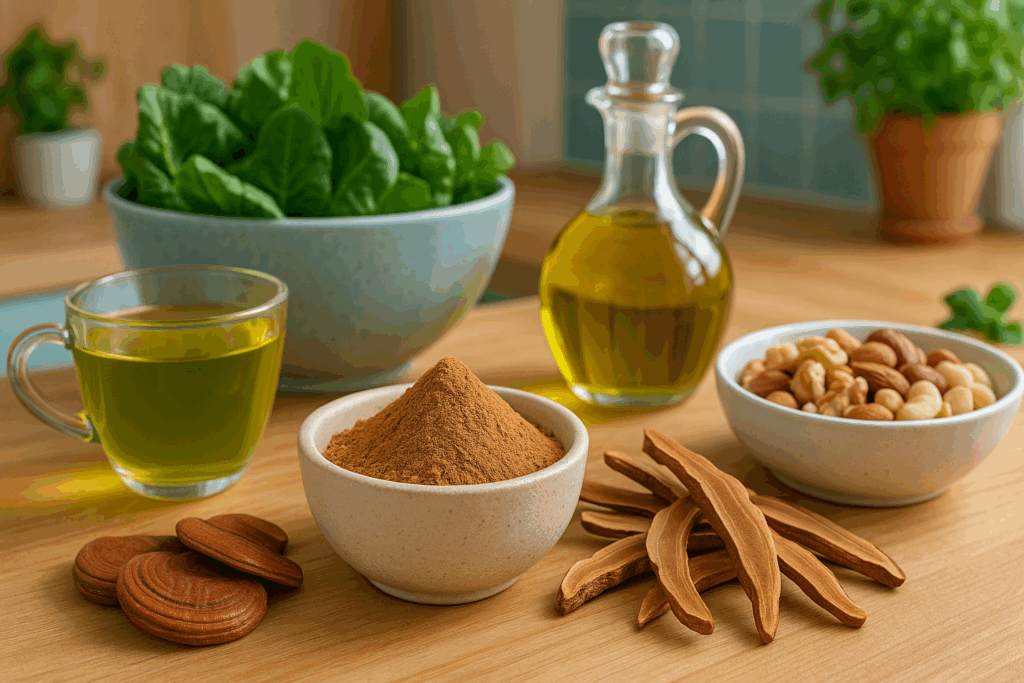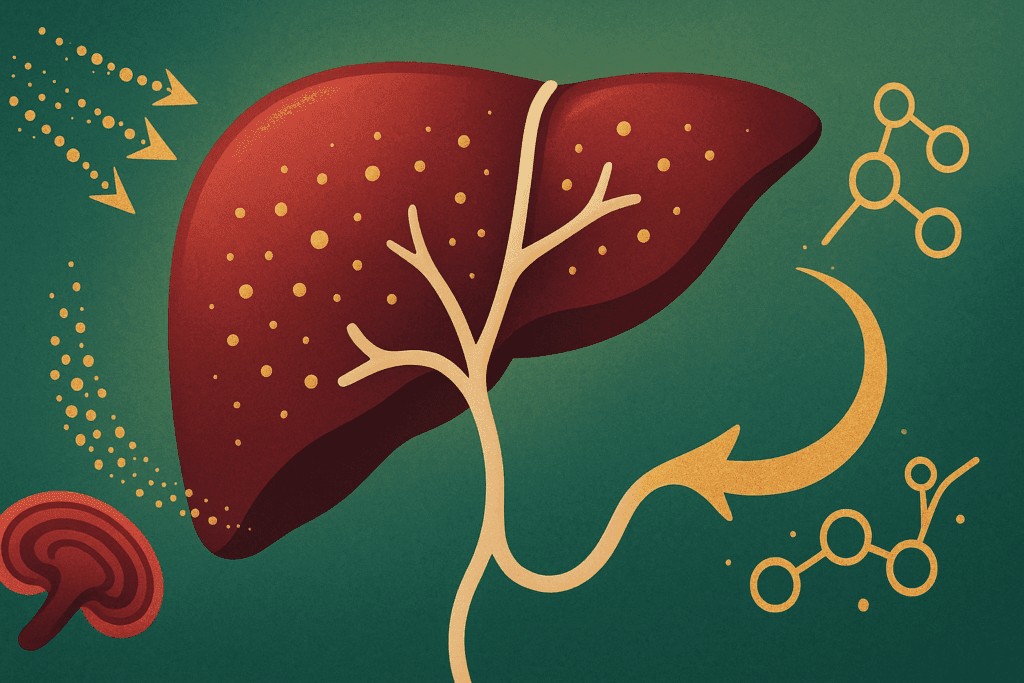In an era of increasing liver disorders and chronic stress, the search for natural remedies that provide holistic health support has grown in urgency and importance. Among the most promising discoveries in the field of integrative medicine is the potential role of the reishi mushroom for fatty liver management and emotional balance. Once a rare treasure in traditional Eastern medicine, reishi mushrooms have emerged as a globally respected adaptogen renowned for their potential to support immune modulation, reduce stress, and promote liver function. For individuals struggling with the physiological and psychological burden of fatty liver disease, this humble mushroom offers a multifaceted avenue of support that warrants both scientific and practical attention.
You may also like: The Essential Guide to Reishi Mushroom Benefits: How to Use Reishi Mushroom Powder for Stress Relief and Adaptogenic Support

Understanding Fatty Liver Disease and the Need for Natural Support
Fatty liver disease, medically termed hepatic steatosis, involves the excessive accumulation of fat within the liver cells. This condition is often categorized into two primary types: alcoholic fatty liver disease (AFLD) and non-alcoholic fatty liver disease (NAFLD), the latter being more prevalent due to rising global rates of obesity, diabetes, and sedentary lifestyles. While fatty liver disease is often silent in its early stages, it can progress to more serious conditions such as non-alcoholic steatohepatitis (NASH), fibrosis, and eventually cirrhosis or liver failure.
Modern pharmacological interventions for fatty liver are limited, and lifestyle modification remains the cornerstone of management. Diet, exercise, and stress reduction are central pillars. However, the potential for complementary natural therapies—such as adaptogenic mushrooms—to enhance these strategies is garnering increasing interest. Reishi mushroom, known scientifically as Ganoderma lucidum, has emerged as one of the best mushroom for liver support thanks to its bioactive compounds with hepatoprotective, anti-inflammatory, and antioxidant properties.

Reishi Mushroom: A Historical and Scientific Overview
The medicinal use of reishi dates back over 2,000 years to ancient Chinese medicine, where it was revered as the “mushroom of immortality.” Traditionally used to enhance vitality, strengthen the immune system, and calm the mind, reishi mushroom was once reserved for royalty due to its rarity and perceived power. With modern cultivation techniques, reishi is now widely available and increasingly studied in biomedical research.
Scientific studies have isolated numerous bioactive compounds in reishi, including triterpenoids, polysaccharides, sterols, and peptidoglycans. These constituents are believed to exert a wide array of therapeutic effects, such as immune regulation, free radical scavenging, and enzyme modulation. Among its most notable benefits is reishi’s capacity to influence liver enzymes and modulate inflammatory responses—both critical factors in fatty liver disease and systemic stress.

The Biochemical Mechanisms Behind Reishi Liver Health Benefits
Reishi’s impact on liver health stems largely from its antioxidant and anti-inflammatory capabilities. Triterpenoids, a class of compounds unique to reishi, have demonstrated potential to suppress the accumulation of fat in the liver by inhibiting lipid synthesis pathways and enhancing fatty acid oxidation. These mechanisms are particularly relevant in addressing non-alcoholic fatty liver, where metabolic dysfunction drives fat deposition.
In addition, polysaccharides in reishi mushrooms have shown promise in reducing oxidative stress within hepatocytes. By enhancing the activity of antioxidant enzymes such as superoxide dismutase (SOD) and glutathione peroxidase (GPx), reishi may protect liver cells from damage caused by lipid peroxidation. This is crucial, as oxidative stress is a well-documented driver of disease progression in both NAFLD and NASH.
Reishi Mushroom for Fatty Liver: A Natural Shield Against Inflammation
One of the most insidious aspects of fatty liver disease is chronic, low-grade inflammation. Persistent inflammation in liver tissue sets the stage for fibrosis and irreversible scarring. The role of reishi mushroom for fatty liver support includes the regulation of pro-inflammatory cytokines such as TNF-alpha, IL-6, and IL-1beta, which are often elevated in individuals with hepatic steatosis.
By downregulating these inflammatory mediators and inhibiting nuclear factor-kappa B (NF-κB) signaling pathways, reishi provides a natural and balanced approach to reducing hepatic inflammation. In animal models, reishi extract supplementation has led to measurable reductions in liver fat, improved liver histology, and normalized levels of liver enzymes like ALT and AST—markers that reflect hepatocellular injury.
Moreover, reishi’s ability to support healthy bile production and flow may further contribute to its hepatoprotective effects. Improved bile circulation assists in the emulsification and elimination of dietary fats, reducing the burden of lipid accumulation within the liver.

The Interplay Between Stress and Liver Health
Stress and liver health are intimately connected through the hypothalamic-pituitary-adrenal (HPA) axis and systemic inflammatory pathways. Chronic stress elevates cortisol levels, which in turn disrupts glucose and lipid metabolism, exacerbating the accumulation of fat in the liver. The persistent activation of stress responses can also impair immune regulation, further compounding liver inflammation.
Given this interplay, it becomes clear why addressing both liver dysfunction and stress is essential for comprehensive health restoration. This is where reishi’s dual role becomes particularly compelling. Reishi acts as an adaptogen—an agent that helps the body adapt to physical, emotional, and environmental stressors without overcorrection. This adaptogenic quality underlies its reputation as a stress-relief agent and makes it a cornerstone in integrative approaches to managing liver health.
How Reishi Mushroom Supports Emotional Balance and Anxiety Reduction
In addition to its hepatoprotective benefits, reishi has been extensively used for its calming effects on the nervous system. Traditional Chinese medicine often prescribes reishi for “shen” disturbances—conditions characterized by insomnia, irritability, anxiety, and restlessness. Modern science supports these traditional uses, with research indicating that reishi may exert anxiolytic effects through the modulation of GABAergic activity and the attenuation of stress-induced neuroinflammation.
The capacity of reishi to normalize cortisol levels and promote parasympathetic nervous system activity provides a biochemical explanation for its relaxing effects. These actions are particularly relevant for individuals with fatty liver disease, who often experience elevated stress levels due to the chronic nature of their condition and its broader metabolic implications.
Furthermore, by reducing oxidative stress in the brain and promoting neurogenesis, reishi may help protect cognitive function in individuals experiencing mental fatigue or brain fog—symptoms often reported by those with advanced liver dysfunction. This makes the best mushroom for fatty liver not only a tool for physiological repair but also for enhancing mental clarity and emotional resilience.

Reishi Mushroom for Fatty Liver: A Functional Food Approach to Holistic Healing
Reishi mushroom is increasingly being incorporated into dietary regimens as a functional food—a nutrient-rich ingredient that offers specific health benefits beyond basic nutrition. When used as part of a comprehensive lifestyle intervention for fatty liver, reishi serves to augment the benefits of diet, exercise, and stress management. For instance, combining reishi supplementation with a Mediterranean-style diet rich in antioxidants and healthy fats may amplify its anti-inflammatory effects.
Moreover, the integration of reishi into daily wellness routines aligns with the concept of food as medicine, emphasizing prevention and long-term health maintenance. When evaluating the question, “Are mushrooms good for your liver?”, reishi consistently emerges as a top contender, not only for its antioxidant profile but also for its immunomodulatory and detoxification-enhancing capabilities.

Reishi Liver Detoxification: Separating Myth from Science
While the phrase “mushroom liver cleanse” may evoke images of rapid detox protocols, it’s important to approach the concept of liver cleansing with scientific nuance. The liver is a self-regenerating organ equipped with its own detoxification enzymes and pathways. However, these pathways can become overwhelmed in the presence of chronic inflammation, poor diet, or environmental toxin exposure.
Reishi does not cleanse the liver in the colloquial sense of the word, but it supports the liver’s natural detoxification processes by enhancing phase I and phase II enzyme systems, reducing hepatic oxidative stress, and promoting healthy bile flow. These effects work synergistically to improve metabolic efficiency and reduce the accumulation of toxins and metabolic waste within the body.
The use of reishi in a supportive, rather than curative, capacity respects the body’s innate intelligence and allows for a gradual, sustainable improvement in liver health. It also invites a broader reconsideration of how we understand detoxification—not as a one-time purge but as a daily practice supported by nutrition, sleep, and emotional balance.
Identifying the Best Mushroom for Liver Health: Why Reishi Leads the Pack
Among the many varieties of medicinal fungi, including chaga, cordyceps, turkey tail, and lion’s mane, reishi mushroom consistently ranks as the best mushroom for liver support. While each species offers unique benefits, reishi’s trifecta of antioxidant, anti-inflammatory, and adaptogenic properties makes it particularly well-suited to support individuals with fatty liver disease.
This is not to diminish the value of other mushrooms in a broader wellness strategy. For example, turkey tail mushroom may offer immune support, while lion’s mane is renowned for its neuroregenerative potential. However, when it comes to liver-specific functions such as modulating hepatic enzymes, reducing lipid peroxidation, and managing stress-induced metabolic disruption, reishi stands apart.
Mushrooms and Liver Health: A Growing Field of Research
The growing body of literature on mushrooms and liver health suggests a paradigm shift in how we approach liver disease. Rather than relying solely on pharmaceutical agents with potential side effects, clinicians and researchers are increasingly exploring botanical and fungal extracts for their multitargeted actions. In this landscape, reishi mushroom occupies a position of prominence due to its extensive historical use and expanding evidence base.
Future studies will likely refine our understanding of optimal dosages, extract types (e.g., spore powder vs. fruiting body), and delivery methods for maximizing reishi’s benefits. However, the foundational research already supports its use as part of an integrative approach to managing fatty liver and its associated comorbidities, including stress, insulin resistance, and systemic inflammation.
Incorporating Reishi Into Your Wellness Routine: Practical Considerations
For individuals considering reishi supplementation, it is crucial to select high-quality products from reputable suppliers. Look for formulations that specify the percentage of active compounds, such as triterpenoids and polysaccharides, and avoid products with unnecessary fillers or additives. Reishi is available in various forms, including capsules, powders, tinctures, and teas, allowing for flexibility based on personal preference and lifestyle.
While reishi is generally considered safe for long-term use, some individuals may experience mild digestive upset or allergic reactions. It is advisable to consult with a qualified healthcare provider before beginning supplementation, especially for individuals with preexisting medical conditions or those taking immunosuppressive medications.
Reishi Mushroom for Fatty Liver Support in the Context of Stress-Relief Protocols
The synergy between reishi mushroom for fatty liver support and stress management protocols is a cornerstone of its value. Incorporating reishi into a broader routine that includes mindfulness practices, regular physical activity, and nutritional optimization can significantly enhance health outcomes. For example, using reishi tea as part of a nightly wind-down routine may promote both restful sleep and liver regeneration, given the organ’s peak detoxification activity during overnight hours.
The intersection of reishi’s liver benefits and its anxiolytic effects underscores the holistic nature of its action. It does not merely target a single symptom but works across physiological systems to promote resilience and healing. This systems-based approach aligns with emerging models of personalized medicine and functional health that prioritize root-cause resolution over symptomatic suppression.
Frequently Asked Questions About Reishi Mushroom for Fatty Liver and Stress Relief
How does reishi mushroom interact with other liver-supportive supplements or medications?
Reishi mushroom is known for its adaptogenic and anti-inflammatory effects, but when it comes to combining it with other liver-supportive supplements or prescription medications, caution is essential. Some individuals may be taking milk thistle, N-acetylcysteine (NAC), or prescription medications such as statins or metformin—all of which influence liver enzymes or metabolic activity. Reishi can potentially enhance or alter the effects of these substances due to its modulation of cytochrome P450 enzymes, which are crucial for drug metabolism. While this interaction doesn’t automatically render reishi unsafe, it does mean that individuals should consult their healthcare provider before combining reishi with other compounds. Personalized monitoring of liver enzymes and medication efficacy can ensure that reishi adds benefit without compromising the effects of other interventions.
Can reishi mushroom support liver health in individuals who don’t have fatty liver disease?
Yes, the benefits of reishi mushroom for liver health extend beyond the context of fatty liver disease. Even in individuals with healthy livers, reishi can play a role in maintaining optimal hepatic function by enhancing antioxidant defense systems and supporting detoxification pathways. This includes upregulating phase II liver enzymes responsible for conjugating and eliminating toxins more efficiently. Furthermore, reishi liver benefits include its ability to protect liver cells from damage caused by pollutants, alcohol, and high-fat diets—even before clinical signs of dysfunction emerge. This makes reishi a proactive choice for long-term liver wellness, particularly in individuals with demanding lifestyles or frequent toxin exposure.
What makes reishi mushroom the best mushroom for fatty liver compared to other medicinal fungi?
While other medicinal mushrooms like chaga, maitake, and shiitake offer a variety of health benefits, reishi mushroom stands out as the best mushroom for fatty liver due to its unique combination of triterpenoids, polysaccharides, and sterols. These compounds work synergistically to reduce lipid accumulation, suppress liver inflammation, and enhance enzymatic activity tied to detoxification. Additionally, reishi influences stress-related metabolic pathways, which are directly tied to fat deposition in the liver—a function not strongly attributed to other mushrooms. Its adaptogenic nature gives it an added edge in supporting hormonal balance and emotional stability, further distinguishing it from other contenders in the space of mushrooms and liver health.
Is there a specific time of day when reishi mushroom is most effective for liver and stress support?
The timing of reishi intake can influence its effects, particularly regarding stress management and liver function. Reishi is often taken in the evening due to its calming influence on the nervous system, which can enhance sleep quality and overnight detoxification—a period when the liver is most active. For individuals prioritizing stress reduction and emotional resilience, nighttime usage may provide the greatest benefit. However, for those targeting metabolic regulation or using reishi as part of a mushroom liver cleanse, morning intake with a meal may better align with the body’s active metabolic window. Ultimately, consistent use and alignment with circadian rhythms may yield the most significant improvements.
How long does it typically take to see benefits from using reishi mushroom for fatty liver?
The timeline for visible improvements from using reishi mushroom for fatty liver can vary depending on the individual’s overall health, lifestyle habits, and stage of liver dysfunction. Most users report subtle changes in energy, digestion, and emotional balance within the first two to four weeks of consistent use. However, clinical improvements such as reduced liver enzyme levels or decreased hepatic fat content, when measurable, may require three to six months of regular supplementation alongside dietary and lifestyle interventions. Reishi liver health support is cumulative and often subtle in its early effects, but it lays a strong foundation for long-term physiological resilience and repair.
Can reishi mushroom be used in culinary applications for liver health?
While reishi is not typically consumed as a culinary mushroom due to its tough texture and bitter taste, it can still be integrated into the diet creatively to support liver function. Reishi powder or decoctions made from its fruiting body can be added to broths, herbal teas, or even blended into smoothies with strong flavors to mask its bitterness. In traditional Asian cuisine, reishi is often simmered for hours to extract its medicinal properties into soups or tonics. These culinary adaptations not only offer a nourishing experience but also support a gentle, food-based approach to mushrooms and liver health that aligns with holistic wellness practices.
What lifestyle changes can enhance the effects of reishi mushroom for liver support?
Reishi mushroom works best when paired with evidence-based lifestyle interventions that reduce liver fat and systemic inflammation. A Mediterranean-style diet rich in leafy greens, omega-3 fatty acids, and low-glycemic carbohydrates complements reishi’s biochemical actions. Regular physical activity, particularly aerobic exercise, can improve insulin sensitivity and synergize with the metabolic benefits of reishi. Additionally, mindfulness practices such as yoga, meditation, or journaling amplify the stress-relief dimension of reishi, making its adaptogenic effects more impactful. Avoiding alcohol, reducing processed food intake, and prioritizing sleep hygiene are also critical in optimizing reishi liver outcomes over time.
What are the emerging trends in reishi mushroom research for liver health?
Recent studies are exploring the potential of reishi mushroom extracts in the field of epigenetics and liver disease prevention. Researchers are particularly interested in how reishi modulates gene expression related to fatty acid metabolism, inflammation, and oxidative stress. There’s also growing attention on nanoparticle delivery systems to improve the bioavailability of reishi’s active compounds, especially triterpenoids. Furthermore, combining reishi with other botanicals such as berberine or silymarin is being investigated for synergistic effects in liver restoration. These innovations point toward a future where reishi mushroom is not only the best mushroom for liver health but also a foundational ingredient in advanced nutraceuticals targeting chronic hepatic conditions.
What are common misconceptions about using a mushroom liver cleanse with reishi?
One common misconception is that a mushroom liver cleanse involving reishi can yield immediate detoxification results or dramatic physical changes. In reality, reishi supports the body’s natural detoxification processes in a gradual and sustainable manner. It doesn’t force toxin elimination or trigger intense cleansing reactions, making it more appropriate for long-term support rather than rapid detox fads. Another myth is that all forms of reishi—capsules, teas, and extracts—are equally effective; in truth, quality and extraction method significantly affect potency. Lastly, some assume that reishi alone can reverse liver damage without dietary changes, but its role is complementary and works best within a broader strategy for mushrooms and liver health.
Why is stress management important when using reishi mushroom for fatty liver treatment?
Stress plays a significant role in the progression of non-alcoholic fatty liver disease by increasing cortisol levels, disrupting glucose metabolism, and promoting inflammation—all of which contribute to fat accumulation in the liver. Reishi mushroom helps interrupt this cycle by acting on the HPA axis and reducing neuroinflammation, but its benefits are magnified when paired with intentional stress management techniques. Activities such as forest bathing, breathwork, or guided visualization can synergize with reishi’s calming properties to reduce systemic stress. Over time, this combination helps normalize hormonal fluctuations and metabolic responses, making it an essential consideration in reishi liver health protocols. By addressing both the emotional and biochemical aspects of liver disease, reishi becomes a powerful agent of holistic healing.
Conclusion: The Holistic Promise of Reishi for Liver and Emotional Well-Being
In a world where chronic liver conditions and stress-related disorders are on the rise, the therapeutic potential of natural interventions like reishi mushroom cannot be overstated. Its multifaceted role as an antioxidant, anti-inflammatory agent, and adaptogen positions it as a powerful ally in the journey toward liver health and emotional balance. While more clinical studies are needed to establish standardized protocols, existing research and centuries of traditional use provide a strong foundation for its inclusion in modern wellness regimens.
When evaluating the question “Are mushrooms good for your liver?” the evidence in favor of reishi is both compelling and increasingly robust. Its ability to support phase I and II detoxification, reduce hepatic fat accumulation, modulate stress hormones, and enhance psychological well-being makes it a standout option among medicinal fungi. As awareness of mushrooms and liver health continues to grow, reishi will likely remain at the forefront of functional medicine’s approach to integrative care.
Ultimately, the use of reishi mushroom for fatty liver represents more than a single intervention. It embodies a shift in how we understand health—not as the absence of disease, but as a dynamic balance of body, mind, and spirit. By embracing natural solutions rooted in both tradition and science, we empower ourselves to move from reactive treatment to proactive vitality.
